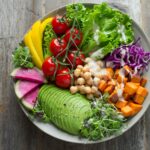The world is changing, and so are our plates. In recent years, vegetarianism and veganism have surged in popularity. More people than ever are exploring the vibrant flavors of plant-based living. This shift isn’t just a trend; it’s becoming a way of life for many.
But why should you consider embracing this lifestyle? Beyond personal taste preferences, there’s a treasure trove of health benefits waiting to be discovered. Imagine feeling lighter, more energetic, and healthier as you savor delicious meals crafted from nature’s bounty.
As we delve into the substantial perks of adopting a vegetarian diet, we’ll also uncover essential nutritional tips to keep your body thriving on plants alone. Whether you’re already dabbling in meat-free meals or contemplating a full transition, there’s something here for everyone—easy recipes to inspire your kitchen adventures and practical advice to guide your journey await!
The Rise of Vegetarianism and Veganism in Recent Years
In recent years, vegetarianism and veganism have gained remarkable traction. Social media platforms overflow with vibrant plant-based meals, inspiring countless individuals to rethink their dietary choices.
This movement is fueled by a growing awareness of health issues linked to meat consumption. Documentaries and books shed light on the benefits of plant-based diets, sparking curiosity among everyday eaters.
Moreover, environmental concerns play a significant role. As more people recognize the impact of livestock farming on climate change, they’re seeking sustainable alternatives that align with their values.
The accessibility of information has never been greater. Recipe blogs, cooking shows, and online communities make it easier for anyone to explore this lifestyle without feeling overwhelmed.
As restaurants adapt menus to cater to these preferences, dining out has become an exciting culinary adventure for vegetarians and vegans alike. The rise isn’t just about food; it’s part of a broader cultural shift towards mindful living.
Health Benefits of a Vegetarian Diet
A vegetarian diet offers an array of health benefits that can enhance your overall well-being. By focusing on plant-based foods, you’re likely to consume more fruits and vegetables, which are rich in vitamins and minerals.
Research shows that vegetarians often have lower risks of chronic diseases. Heart disease, type 2 diabetes, and certain cancers are less common among those who embrace a meat-free lifestyle.
Moreover, incorporating whole grains, legumes, nuts, and seeds into your meals boosts fiber intake. This not only aids digestion but also helps maintain a healthy weight.
Mental clarity may also improve with this diet. A diverse range of nutrients supports brain function while reducing inflammation in the body.
This holistic approach can make you feel energized and vibrant as you nourish your body with wholesome ingredients.
Nutritional Considerations for a Plant-Based Diet
When embracing a plant-based diet, it’s essential to pay attention to key nutrients. While fruits and vegetables are rich in vitamins and minerals, some nutrients require extra focus.
Protein is vital for muscle repair and overall health. Incorporate legumes, nuts, seeds, and whole grains into your meals. These sources not only offer protein but also provide fiber.
Vitamin B12 deserves special consideration. This vitamin is primarily found in animal products. Consider fortified foods or supplements to ensure adequate intake.
Iron can be abundant in plants like lentils and spinach but may have lower bioavailability than meat sources. Pairing these with vitamin C-rich foods can enhance absorption.
Don’t forget about omega-3 fatty acids! Include flaxseeds or chia seeds as great alternatives to fish oils for heart health support.
Stay mindful of calcium intake from leafy greens or fortified plant milks. Balancing these nutritional aspects will help you thrive on a vegetarian journey.
Easy and Delicious Vegetarian Recipes
Exploring vegetarian recipes can be a delightful adventure. One popular dish is the hearty lentil soup. Packed with protein, it warms you up on chilly days and bursts with flavor from garlic, onions, and spices.
Another favorite is stuffed bell peppers. Fill them with quinoa, black beans, corn, and diced tomatoes for a colorful meal that’s as pleasing to the eye as it is to your taste buds.
For something lighter, try zucchini noodles topped with pesto. This refreshing option satisfies pasta cravings while keeping things wholesome.
Don’t overlook breakfast! A smoothie bowl made from bananas, spinach, and almond milk offers a quick yet nutritious start to your day. Garnish it with nuts or seeds for added crunch.
With so many options available, creative cooking becomes second nature when embracing vegetarian meals. Enjoy experimenting in the kitchen!
Tips for Making the Transition to a Vegetarian Lifestyle
Transitioning to a vegetarian lifestyle can be exciting and rewarding. Start small. Incorporate one meatless meal into your week, then gradually increase it.
Explore different cuisines that naturally emphasize vegetables, legumes, and grains. Indian or Mediterranean dishes often provide an abundance of flavor without meat.
Stock your pantry with staples like lentils, chickpeas, quinoa, and tofu. These ingredients are versatile and filling.
Experiment with plant-based substitutes for your favorite foods. There are fantastic alternatives for burgers, sausages, and dairy products available today.
Listen to your body as you adjust to this new way of eating. You might find yourself craving certain nutrients; seek them out in plant sources like nuts or seeds.
Connect with online communities or local groups focused on vegetarianism for support and inspiration. Sharing experiences makes the journey smoother and more enjoyable!
Sustainability and Environmental Impact of a Plant-Based Diet
Adopting a plant-based diet can significantly reduce your carbon footprint. Livestock farming is one of the leading contributors to greenhouse gas emissions. By choosing vegetables, fruits, grains, and legumes over meat and dairy, individuals can help mitigate climate change.
Plant-based diets also require less water and land compared to animal agriculture. For instance, it takes thousands of gallons of water to produce just one pound of beef. In contrast, crops like beans or lentils use far fewer resources.
Furthermore, reducing reliance on animal products helps preserve biodiversity. Factory farming often leads to habitat destruction as forests are cleared for grazing lands or feed crops.
Transitioning towards vegetarianism supports sustainable agricultural practices that prioritize local ecosystems. This conscious choice promotes healthier soil and encourages regenerative methods that benefit both people and the planet. Every meal offers an opportunity to make a positive impact on our environment.
Common Myths and Misconceptions about Vegetarianism
Vegetarianism is often shrouded in myths and misconceptions that can deter people from exploring this healthy lifestyle. One common belief is that vegetarians don’t get enough protein. In reality, there are plenty of plant-based sources like beans, lentils, quinoa, nuts, and seeds that provide ample protein.
Another myth suggests that a vegetarian diet lacks essential nutrients. While it’s true that certain nutrients (like vitamin B12 and iron) require some attention in a plant-based diet, many foods are fortified or naturally rich in these nutrients. Leafy greens provide iron while dairy alternatives can offer B12.
People also think transitioning to a vegetarian diet means sacrificing taste or variety. The world of vegetarian cooking is vibrant! There are countless recipes featuring spices and flavors from every corner of the globe.
Some fear they might not feel full without meat. However, whole grains, legumes, fruits, and vegetables create satisfying meals packed with fiber—keeping you feeling fuller for longer.
There’s an idea floating around that vegetarianism is only for health enthusiasts or environmentalists. That’s simply not true; anyone can choose to eat more plant-based meals based on personal preference or curiosity about trying something new.
Addressing these misconceptions opens up the conversation around the benefits of adopting a vegetarian lifestyle. With knowledge comes empowerment—and who knows? You just might discover your favorite dish among the myriad options available!


